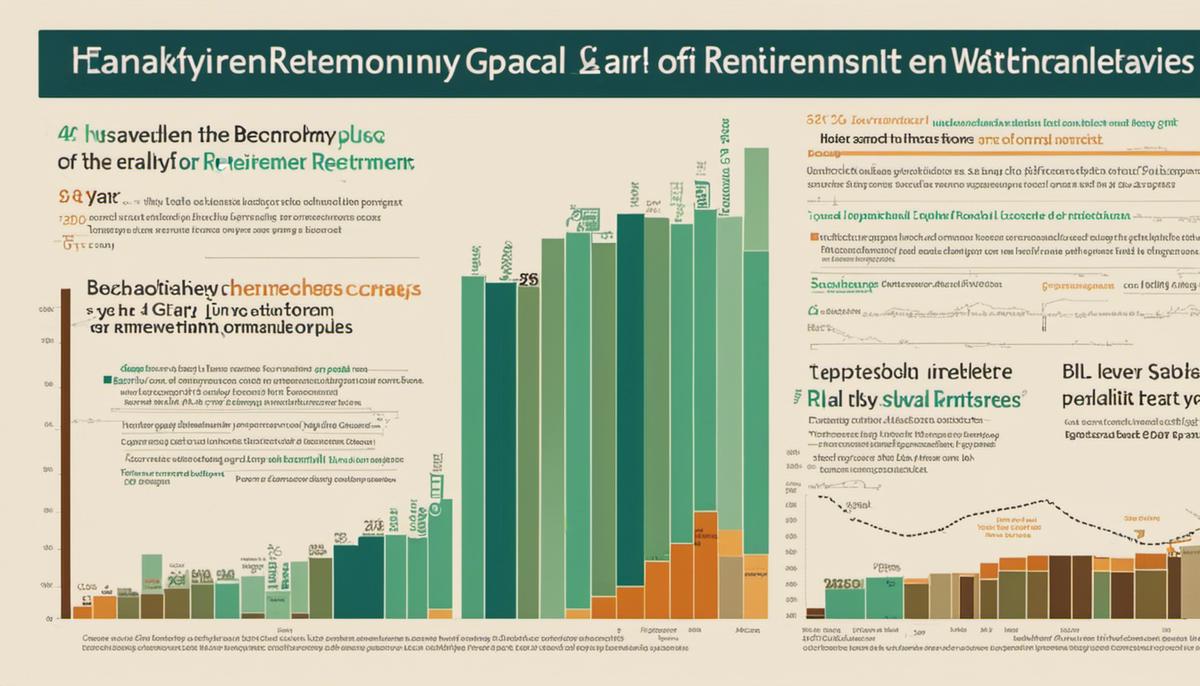Understanding Early Retirement Penalties 2024
As the dynamics of retirement continue to evolve, understanding the nuances of early retirement penalties gains significant importance. Retirement is not merely a concept about bidding goodbye to one’s career; it’s about strategic financial planning that can lay out a secure pathway for your golden years. This essay sheds light on the fundamental aspects and complexities of early retirement penalties in the year 2024, illuminating the financial and taxation implications one might face when exiting the workforce prematurely. Delving into the mechanics behind these punitive measures, the ensuing discussion will offer detailed insight backed by historical data and reliable sources. Your journey through this piece will equip you with various strategies to circumvent potential penalties, while also revealing the wider economic consequences of such penalties on our society.
Understanding Early Retirement Penalties
Predicting and Preparing for the Financial Implications of Early Retirement in 2024
Planning for early retirement is an exciting prospect that elicits images of leisurely days spent pursuing hobbies or traveling the world. However, this dream doesn’t come without its financial implications. In light of the shifts toward a remote-working economy, and adjustments following the pandemic, how does early retirement look in 2024?
Financial Readiness
First off, early retirement hinges significantly on being financially prepared. The goal is to have accumulated enough savings and investments to cover living expenses for the rest of your life. This translates to having a larger nest egg than if you would retire later due to the extended retirement horizon, which is impacted by several factors, including inflation, health expenses and spending habits.
Income Taxes
Depleting this nest egg too rapidly can have severe consequences. Drawing down retirement accounts earlier could push you into a higher tax bracket, leading to increased income taxes. Opting to retire early could also trigger more severe penalties for premature distributions from retirement accounts before hitting the age of 59.5.
Social Security
Moving on, let’s tackle Social Security. This valuable income stream adjusts based on the age you begin receiving benefits. Retiring early and opting to draw on Social Security benefits before the full retirement age reduces the amount. In 2024, full retirement age will be 67 for people born in 1960 or later, so drawing early would lead to a significant drop in benefits.
Healthcare Costs
It’s no secret that healthcare costs are rapidly escalating. Early retirees, not yet eligible for Medicare, may need to budget for private health insurance, potentially an enormous portion of an early retiree’s monthly budget.
Investment Opportunities and Risks
Lastly, let’s mull over the investment opportunities and risks. Early retirement necessitates more conservative investment strategies to protect the nest egg against market volatility. This approach may limit potential growth and restrict opportunities to boost retirement funds.
Adapting the Retirement Paradigm
Despite these implications, don’t dismiss the idea of early retirement just yet. The shifts in work patterns brought by the global pandemic has opened possibilities for semi-retirement where part-time remote work can supplement dwindling retirement funds. Technology has also created opportunities for passive income streams that can extend your nest egg’s longevity. Barring the traditional retirement route, what’s imperative is innovative approaches to diversifying income while managing expenditures, taxes, and healthcare costs.
Early retirement in 2024 comes with its fair share of financial implications. Nonetheless, thorough planning, wise investments, combined with a flexible and innovative approach to income generation can make the dream of early retirement a feasible reality.

Tax Implications of Early Retirement
“The Tax Implications of Early Retirement in 2024 – A Comprehensive Perspective”
Subhead: “Unfolding The Tax Narrative of Early Retirement”
A trend surfacing on the financial forefront is the pursuit of early retirement, fueled by the FIRE (Financial Independence, Retire Early) Movement. However, the decision to step into the golden years ahead of the average timeline has a profound impact, particularly on tax obligations.
Subhead: “Understanding the Tax Paradigm”
Calling it a day earlier than anticipated triggers tax obligations, both expected and unforeseeable. The Internal Revenue Service scrutinizes retirement account distributions stringently. Striking a balance between enjoying your nest egg and minimizing the tax hit requires astute tax planning and dynamic financial management.
Subhead: “IRA Withdrawals and IRS Penalties”
Traditional Individual Retirement Accounts (IRAs), 401(k) accounts, and similar tax-deferred retirement savings plans are classic vehicles to building a retirement corpus. Withdrawing from these before age 59 1/2 typically levies a 10% early withdrawal penalty. However, in 2024 there are exceptions such as substantially equal periodic payments (SEPP) that sidestep this issue, presenting a viable option for early retirees.
Subhead: “The Roth IRA – A Silver Lining”
The Roth IRA provides a glimmer of hope for early retirees. Since contributions to Roth IRAs are made post-tax, the regulations allow for tax and penalty-free withdrawals of contributions at any time. Pertinently, this eases the tax burden and reinforces the importance of diverse retirement savings strategies.
Subhead: “Capital Gains– An Emerging Trend”
Early retirement, more often than not, features sizable asset portfolios. Leveraging the tax structure on long-term capital gains may provide a substantial income stream. With the tax rates on these gains destined to remain favorable in 2024, astute asset management could balance the scales on the tax front.
Subhead: “Taxable Accounts and HSA – Game Changers”
The versatility of taxable investment accounts should not be underestimated. These accounts, coupled with Health Savings Accounts (HSA), offer a strategic channel for income during early retirement. Income from these outlets is predictable and controllable, tying up the loose ends for a comprehensive tax management strategy.
In conclusion, the early retirement landscape in 2024 is no less than a dynamic construct that demands innovative approaches, acute tax planning, and adaptive financial management. It’s about curating a financially diverse and tax-efficient strategy that harmonizes retirement dreams with tax obligations.

Retirement Strategies to Avoid Penalties
Strategies for Alleviating Early Retirement Penalties: A Fresh Perspective for 2024
As the retirement landscape continues to evolve, retirees need innovative ways to bypass the usual financial hurdles in the golden years. Many look for strategies to avoid penalties associated with early retirement, such as tax obligations on retirement account distributions and IRS scrutiny. This article will elaborate on fresh, savvy ways to address these issues by leveraging different account types, investments, and smart planning.
The concept of Retiring Early, Financially Independent (FIRE) is no trend – it’s a seismic shift in the retirement paradigm. Savvy investors are turning to Roth Individual Retirement Accounts (IRAs) as a go-to solution to sidestep early retirement penalties. Roth IRAs offer enticing benefits like tax-free withdrawals of contributions, making them increasingly popular among early retirees keen on reducing tax liability.
Moreover, the IRS has some exceptions for early withdrawals from retirement accounts in 2024, which potential retirees should be cognizant of. These exceptions can allow retirees access to their funds without incurring the typical early distribution penalties – a relief when you need income before the traditional retirement age.
Another innovative approach to maneuver past early retirement tax obligations lies in utilizing the tax structure on long-term capital gains. With thoughtful planning and efficient financial management, one can potentially leverage their investments for income in early retirement while essentially dodging the tax bullet. This strategy calls for an in-depth understanding of the market trends and sound financial advice to maximize returns and minimize tax hits.
Diversification remains king in retirement planning, and never more so than in the complexities of early retirement. Consider the versatility of taxable investment accounts and Health Savings Accounts (HSAs). Both can provide income during early retirement. An HSA, for example, is triple tax-free: contributions are tax-deductible, growth is tax-free, and withdrawals for qualified medical expenses are also tax-free.
Taking a holistic approach to tax management for early retirement planning in 2024 spells the difference between a comfortable, secure retirement and one laden with financial stress. The intricacies of leveraging various types of accounts, capitalizing on tax laws, and planning long-term investments require careful choreography.
In conclusion, as 2024 approaches, the shifting landscape of early retirement necessitates innovative solutions. By strategizing based on the interplay of IRS rules, tax structures, and diversified accounts, the savvy investor can effectively bypass or at least lighten the load of initial retirement penalties, ultimately paving the way for an enjoyable and financially secure early retirement.

Impact of Early Retirement Penalties on the Economy
A shift has been witnessed in the national economy due to the increasing inclinations towards early retirement. A significant contributor to this alteration is the sanctioning of penalties for early retirement, impacting several key economic factors.
One of the most noteworthy consequences of early retirement penalties is the potential deterrence they pose for those considering early retirement. These penalties can discourage individuals from withdrawing their retirement funds prematurely, leading to increased workforce longevity and sustained productivity at the national scale.
A reduction in early retirement could conversely bolster the national economy through maintained consumer spending. Early retirees, cautious of penalties, may restrain their spending, impacting various market sectors – from leisure and tourism to the real estate. A consistent spending pace from the working population can contribute to steady economic growth.
Interestingly, the rise in early retirement penalties could catalyze entrepreneurship and independent business establishments. As many seek alternative methods for income generation in place of accessing their retirement funds, there’s an anticipated surge in small businesses and startups. Such economic behavior supports a diverse market, fostering innovative product offerings and entrepreneurial resilience, playing a pivotal role in shaping a robust national economy.
Early retirement penalties could also influence investment behavior. As individuals become more cautious of withdrawing their retirement contributions early, the quest could be towards less risk-averse investment options. This potential orientation towards safer investment strategies would provide stability to financial markets and curtail extreme market volatility.
Moreover, these early retirement penalties influence governmental tax revenue. These penalties, essentially extra financial charges, are subjected to taxes. This translates into an increase in tax revenue, which can be redirected for essential public services or economic contingency plans.
The year 2024 is set to observe continued flexibility in relation to early retirement penalties. An emphasis is on enabling individual choices while ensuring penalties do not unduly strain one’s financial health or hamper national economic growth. This includes special exemptions, optimal utilization of Roth IRAs, and effective tax management strategies.
It’s clear that early retirement penalties bear significant clout in shaping both individual financial decisions and the broader national economy. It is increasingly important to better comprehend these penalties and devise intelligent strategies to mitigate their impact while navigating the evolving landscape of early retirement.
Going forward, the focus must be on cultivating a balanced system, one that respects individual choice aligning with national economic wellbeing. This includes fostering an environment of financial literacy, encouraging diversified income generation, promoting entrepreneurial initiatives, and developing a holistic, effective retirement planning framework.
In conclusion, the effect of early retirement penalties on the national economy is multi-faceted. These penalties are integral in steering economic stability, consumer spending patterns, entrepreneurial growth, investment behavior and generating tax revenue. Wisdom lies in adapting, innovating, and strategizing with these realities to ensure financial prosperity for individuals and the nation.

Confronting early retirement penalties requires a solid grasp of financial market trends, tax laws, and prudent investing strategies. This comprehensive exploration of the issues hopes to assist potential retirees in navigating their way through the maze of early retirement hurdles in 2024. By understanding the tax implications and using innovative approaches drafted by financial experts, one can best position themselves to make the most of their retirement years. Every individual’s story is different, but a carefully curated retirement plan can smooth the transition out of the workforce. Remember, the economic implications of early retirement extend beyond personal finances, contributing to broader economic trends and societal impacts. Knowledge is power, and with this understanding of early retirement penalties, you’re armed with the right tools to make informed decisions as you step into your retirement journey.


Leave a Reply